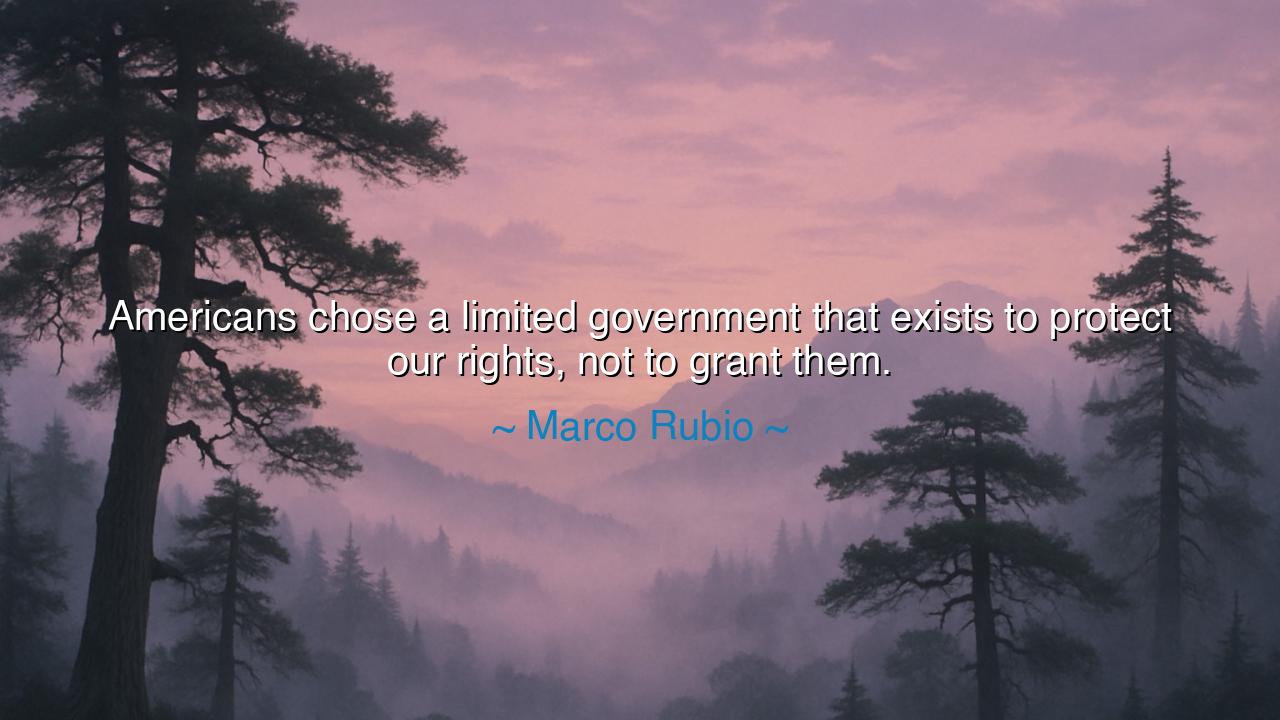
Americans chose a limited government that exists to protect our
Americans chose a limited government that exists to protect our rights, not to grant them.






In the age of nations and the struggle for liberty, when the memory of tyranny still haunted the hearts of free men, the American statesman Marco Rubio declared these words of enduring truth:
"Americans chose a limited government that exists to protect our rights, not to grant them."
Though spoken in the modern era, these words carry the echo of ancient wisdom — a wisdom born from the blood and faith of those who once cast off kings and empires. Rubio’s declaration is not mere politics; it is a reminder of the sacred covenant upon which the United States was founded — that rights are not gifts of the state, but inheritances of the soul. Governments may rise and fall, laws may change and bend, but the essence of liberty — the right to speak, to worship, to live — belongs to every human being by birth, not by decree.
The meaning of his words lies in the distinction between protection and possession. A limited government is not weak, but wise. It recognizes that true authority does not flow downward from rulers to the ruled, but upward from the people to their chosen representatives. Such a government stands as guardian, not master — a watchman set to defend the natural rights endowed to man by his Creator. When Rubio says that government exists to “protect our rights,” he invokes the same spirit that stirred the pens of Thomas Jefferson and James Madison, who wrote that liberty is not something bestowed, but something defended. For if government gives rights, then government can take them away. But if rights come from something higher — from the very nature of humanity — then no power on earth can justly destroy them.
The origin of this truth lies in the founding of the American Republic. In the eighteenth century, the colonies of the New World had grown weary of royal decrees and distant tyrants who claimed divine sanction to rule. From that weariness rose the Declaration of Independence, a document that did not merely demand separation, but proclaimed an eternal truth: that all men “are endowed by their Creator with certain unalienable Rights.” These words shattered the old belief that kings could define the worth of their subjects. The founders, in their wisdom, did not invent liberty; they acknowledged it. They understood, as Rubio reminds us, that government must serve the people’s rights, not manufacture them.
History offers harsh lessons to those who forget this balance. Consider the fall of the Roman Republic, once built on civic virtue and the consent of free citizens. As Rome expanded, its leaders grew hungry for control. The Senate, once the servant of the people, became their master. The emperors that followed claimed divine authority, demanding obedience rather than earning trust. Rights became privileges — handed out to the loyal, denied to the dissenters. Thus liberty perished, not in war, but in the slow surrender of the people’s sovereignty. Rubio’s warning, spoken centuries later, echoes this ancient tragedy: whenever a people forget that their rights exist beyond government, they invite servitude disguised as security.
And yet, his words are not a call to rebellion, but to responsibility. A limited government requires a vigilant people. Freedom is not preserved by speeches or symbols alone; it must be renewed daily by those who understand its cost. The founders knew this well. When Benjamin Franklin was asked what kind of government the new nation had created, he answered, “A republic — if you can keep it.” The keeping of that republic demands that citizens remember the sacred order of things: government protects; people create. Government enforces; conscience guides. The strength of liberty lies not in the power of rulers, but in the virtue of the governed.
Throughout the ages, nations that forget this truth have fallen into tyranny’s shadow. When people begin to believe that their rights are permissions — granted by kings, parties, or bureaucrats — they cease to be free. But when they believe, as Rubio and the founders believed, that freedom is the birthright of the human soul, then no force, however vast, can crush their spirit. The limited government is not a cage, but a covenant — a structure that restrains power so that humanity may thrive in dignity.
So let this teaching be passed down as wisdom for all generations: remember always that rights are not favors, and liberty is not charity. Governments exist to shield, not to bestow. Citizens must cherish and defend their freedoms as sacred trusts, never surrendering them for comfort or fear. In your time, when power grows restless and promises of safety grow sweet, recall these words and stand firm: freedom is yours by nature, not by permission.
Thus ends the teaching: a government that knows its limits preserves the people’s greatness; a people who know their rights preserve the soul of the nation.






AAdministratorAdministrator
Welcome, honored guests. Please leave a comment, we will respond soon